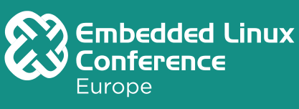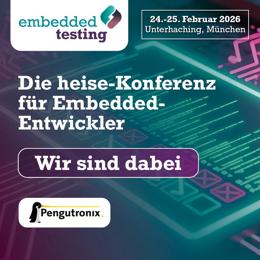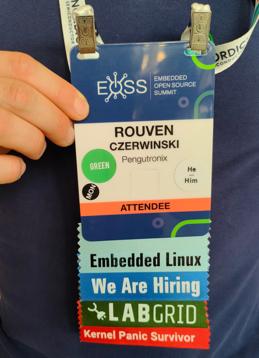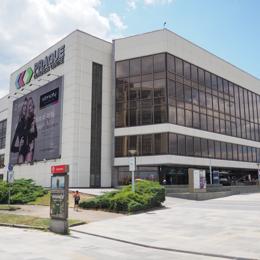Pengutronix at the Embedded Linux Conference Europe
The schedule for this year's Embedded Linux Conference Europe (ELCE) has just been released. As in the last years Pengutronix contributes talks to current topics around Embedded Linux.
The ELCE is not going to be held in Dublin as announced last year. Instead it will be held as a virtual conference. This makes it especially easy for Embedded Linux newcomers to take a look at this conference. The registration is still possible.
The following submissions by Pengutronix have made it into the program:
Beyond "Just" Booting: Barebox Bells and Whistles (Ahmad Fatoum)
Monday, 26.10.2020 13:00-13:50 (GMT+1) (Link to Schedule)
Your bootloader can boot into Linux, what else could you possibly need? Originally started as a more structured U-Boot fork with a driver model, barebox has since grown into a versatile Swiss Army Knife for bootstrap, hardware bring-up and development of Linux-based systems.
In his talk, Ahmad will show you how to get barebox running on your board and along the way explain barebox' design choices, from multi-image support to virtual file systems, POSIX/Linux API, fail-safe updates, boot fall-back mechanisms, customizability and more.
Boot-Time Optimization for the Real World (Michael Olbrich)
Monday, 26.10.2020 14:00-14:50 (GMT+1) (Link to Schedule)
There have been many talks about boot-time optimization in the past. For the most part, the only goal was a minimum boot-time. It's a good way to show the optimization techniques and gives a nice wow effect. But the end result is rarely usable in real world projects. So instead of looking for new ways to reduce the boot-time just a little bit more, this talk will look at boot-time optimization in a larger context.
"The device needs to boot faster" is often stated but the actual requirements behind this are often more complex. We will look at typical requirements and possible solutions beyond general boot-time optimization. And while booting as fast as possible is nice, in most cases there are other more important requirements, which are often related to security or reliability. This talk will look at possible optimizations in this context. What are the consequences of an optimization and what trade-offs are possible?
And last but not least, let's talk about the hardware. The choices made while designing a device can have a big impact on the boot-time. Therefore this talk will end with advices for hardware design criteria and component decisions to keep in mind to boot fast.
OP-TEE is Ready: Let's Use It! (Rouven Czerwinski)
Tuesday, 27.10.2020 19:30-20:20 (GMT+1) (Link to Schedule)
OP-TEE for i.MX6 SoCs is production ready, so we finally have a fully mainline way to use TrustZone on a widely available platform. So what are the scenarios where it can increase security or allow new features? This talk will present the current state of OP-TEE from an upstream perspective on i.MX6 SoCs and show two different Trusted Applications (TAs) which provide secure data storage or TPM functionality.
One of the presented applications will be the PKCS#11 TA, which is currently being upstreamed into the mainline OP-TEE project. In conjunction with the OpenSSL PKCS#11 engine, it can be used to store client certificate data which can not be extracted from the device. The other application will be the Microsoft firmware TPM, which is provided as an out-of-tree TA with an upstream Linux kernel driver. It is meant as a replacement for conventional hardware TPMs and provides a tighter coupling to the chosen SoC.
Furthermore this talk will highlight the necessary steps to actually secure OP-TEE on your chosen SoC, using the i.MX6 platform as an example.
The State of PTXdist (Roland Hieber)
Wednesday, 28.10.2020 18:15-19:05 (GMT+1) (Link to Schedule)
PTXdist has been around as a build tool for Embedded Linux systems for more than 16 years now. During its monthly release cycle, besides the usual maintenance tasks, useful features are continuously being added. In the last years, these included support for kconfig deltas and layered BSPs, infrastructure for cryptographic code signing and license compliance, support for reproducible builds, and online reference documentation. With its configuration menu for selecting the software packages for your target system, and a template wizard for creating new packaging rules, PTXdist makes it possible to get a booting BSP in almost no time. Advanced users will feel familiar with PTXdist's makefiles, and can profit from fast edit-compile-run cycles by using nfsroot and cross-gdb integration.
This talk gives an overview over the core concepts and the current feature set of PTXdist, and is intended for new as well as old users.
Further Readings
Pengutronix bei der Embedded Testing 2026
Pengutronix ist in diesem Jahr wieder Partner der der Embedded Testingu nd ist dort sowohl mit einem Stand als auch mit einem Vortrag vertreten. Die Embedded Testing findet am 24. und 25. Februar 2026 in Unterhaching bei München statt.Pengutronix at FOSDEM and OE Workshop 2026
On January 31st and Febuary 1st 2026 it is once again time for waffles, Belgian beer and Open Source: FOSDEM will take place at ULB in Brussels. With over 8k hackers, FOSDEM is the biggest and most important Open Source conference in Europe. One other event riding the wave of FOSDEM is the the OpenEmbeddedWorkshop. The full list of co-located events is here. We are participating in both FOSDEM and OE Workshop and are looking forward to many interesting discussions with developers of different Open Source software components – be it the Linux kernel, Yocto, Labgrid, Debian, and others...
GStreamer Conference 2025
This years GStreamer conference was held at the end of Oktober in London, UK. Since GStreamer is our goto-framework for multimedia applications, Michael Olbrich and me were attending this years conference to find out what's new in GStreamer and get in touch with the community.
Pengutronix at Open Source Summit Europe and Embedded Linux Conference Europe
The Embedded Linux Conference Europe is Pengutronix' most important conference of the year. It is a good place to meet new faces in the embedded community, discuss current topics and future developments with maintainers and developers - and of course: have a beer with old friends. As usual, many Pengutronix colleagues will attend: this year we'll have a 14 person team on site. So watch out for our T-shirts and hoodies and and feel free to chat with us.
Embedded Linux Conference Europe 2023: Our Recommendations
Last month Pengutronix was present at the Embedded Open Source Summit (EOSS) in Prague. Thanks to all to all speakers for sharing your knowledge! In this blog post we want to shine a spotlight at a few talks that we found especially interesting. (Links to recordings will be added once the recordings are available.)
Embedded Linux Conference Europe 2023: Our Contributions
This year the Embedded Linux Conference Europe (ELCE) is back in Prague! Pengutronix, again, is on a field trip with 15 colleges to attend the conference. The ELCE is one of the big conferences where the Embedded Linux Community meets during the year. This time the ELCE is part of the Embedded Open Source Summit (EOSS): a new conference with only embedded topics and without cloud- or crypto-tracks.








